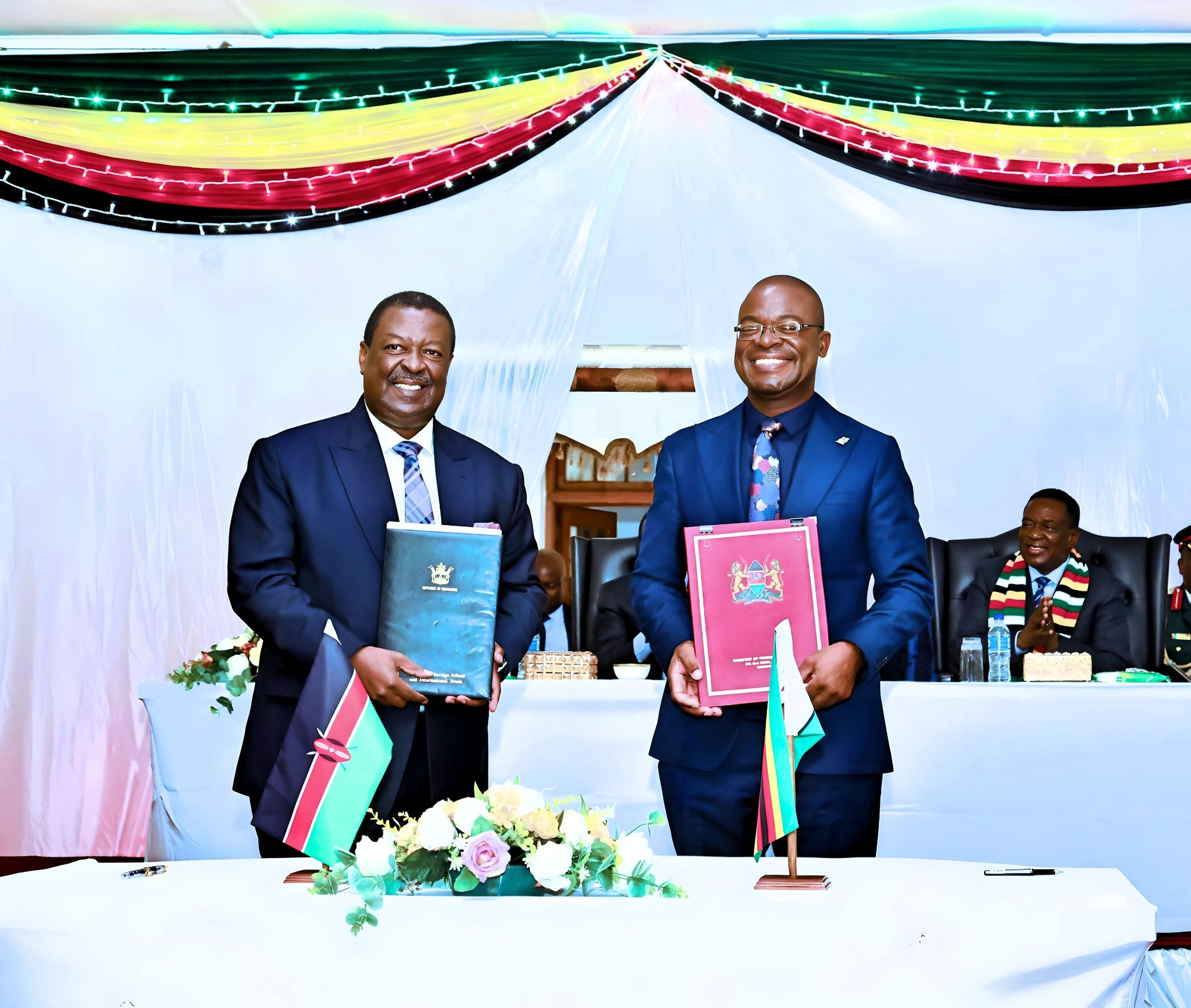Kenya and Zimbabwe have agreed to enhance trade and investment in both countries, even as they signed agreements to boost some of the major sectors of the economy.
On economic and trade clusters, the two countries signed four Memorandums of Understanding (MoUs) which include Kenya Bureau of Standards (KEBS) and Standards Association of Zimbabwe (SAZ) to establish a framework for exchange of scientific and technical knowledge as well as enhance capabilities of the two institutions.
According to a statement from Foreign Affairs and Diaspora Affairs Ministry, also signed was an agreement in the field of Transport and transport infrastructure.
“The objective of the MoU is to enhance cooperation in development of road transport infrastructure and promote private sector investment in infrastructure development,” the statement on the JPCC meeting held in Harare, Zimbabwe said.
Other agreements are between Kenya Investment Authority (KenInvest) and Zimbabwe Investment and Development Agency (ZIDA).
The objective of the MoU is to enhance cooperation between the two institutions and to strengthen economic, technological and investment relations. The MOU will also facilitate exchange of information on investment potentials and promote bilateral foreign direct investments in the two countries.
The fourth agreement was on bilateral cooperation in agriculture and livestock development, which seeks to enhance food security through technological development, transfer, research and training.
“On this cluster, we agreed to continue advancing negotiations on pending instruments in the fields of trade and investment, air services, maritime and shipping, exploration, mining and metallurgy, renewable energy, water and irrigation, customs administration and mutual assistance,” the statement shows.
On the social cluster, the meeting reached agreement on three MoUs in the field of Basic Education, Training and Research.
“The MoU addresses higher and tertiary education training, skills and human capital development, science, technology and innovation, TVET and collaboration between Councils for Higher and Tertiary Education of Zimbabwe and Kenya,” the statement indicated.
The two countries also signed agreements in the health sector, which aims at facilitating cooperation in the area of professional education and technical training of health professionals.
Another signing was between the Public Service Commission of Zimbabwe and the Kenya School of Government (KSG) in the field of capacity development in the public service.
The MoU will enable the two institutions to enhance human capital development and management, including capacity development, joint research and public service transformation.
The meeting also agreed to advance pending negotiations in affordable housing and promotion of appropriate building materials and new technologies, culture and arts, twinning arrangements between counties in Kenya and provinces in Zimbabwe, urban and metropolitan development, labour and employment, training of cardiovascular perfusionists between Parirenyatwa group of Hospitals from Zimbabwe and Tenwek hospital from Nairobi.
The Ministers also agreed to bolster implementation of instruments signed in 2022 which include, youth affairs and promotion of women empowerment.
To keep track of decisions agreed on, the fourth JPCC stressed the need of not only signing instruments but also ensuring their operationalization. To this end, the two countries agreed on the implementation modalities of the finalized and existing MoUs.
The two countries will be expected to form Joint Technical Committees that will develop a comprehensive framework for their regular monitoring and evaluation.
Kenya will convene the next session of the Midterm Review (MTR) of the fourth session during the first quarter of next year.
In line with the proposal to bolster bilateral engagement from JPCC to a Bi-national Commission, Kenya will host the Inaugural Bi-National Commission in the first quarter of 2026.
They also agreed to accelerate implementation of instruments signed in 2022 which include cooperative development, tourism and wildlife conservation.




